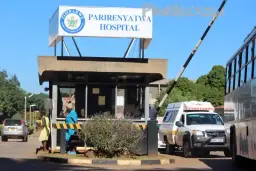PARIRENYATWA Group of Hospitals has begun offering magnetic resonance imaging (MRI) scan services that diagnose cancers, neurological disorders and heart disease, among other conditions, with over 100 patients having benefitted since September last year.
A state-of-the-art MRI centre was commissioned by President Mnangagwa at the country’s largest health referral centre last September. The Government procured a high-tech 1.5 Tesla MRI machine to help enhance the diagnosis of some diseases.
Another unit, also procured by the Government, was installed at Mpilo Hospital in Bulawayo in October. This milestone marks a significant step towards increased accessibility and affordability of the service to Zimbabweans. The 1,5 Tesla MRI is a specialised imaging tool suitable for a diverse range of examinations, including brain imaging for diagnosing tumours, stroke and other neurological disorders; musculoskeletal imaging for assessing bones, joints, muscles and ligaments; abdominal and pelvic imaging for evaluating organs like the liver, kidneys, uterus and ovaries; cardiac imaging for examining the heart and its structures; and spinal imaging for diagnosing problems with the spinal cord and nerves.
The scanners typically have a wider bore, offering more space for patients, and potentially reducing claustrophobia anxiety.
Prior to the establishment of the centre, such scans were only available at private healthcare institutions, with costs per scan often exceeding US$500, placing the service beyond the reach of many Zimbabweans.
However, Parirenyatwa and Mpilo are now offering MRI scans at a significantly lower cost compared to private facilities.
The MRI unit at Parirenyatwa is offering brain, C-spine, abdomen joints and pelvis scans for prices ranging from US$350 to US$400, or equivalent at the prevailing official exchange rate. Additionally, the hospital accepts medical aid and payment plans, ensuring broader access for patients.
In an interview with The Sunday Mail, Parirenyatwa Group of Hospitals head of public relations Mr Linos Dhire said: “The hospital has benefitted immensely with the acquisition and installation of the MRI unit.
“The hospital has become a one-stop facility for the patients; instead of visiting the hospital for consultation and then going out for further investigation, everything is now being done under one roof. From its inception in September, we have managed to scan over 100 patients.”
The number of patients receiving the service at the institution, Mr Dhire said, was expected to go up. “Applications training has been offered to the radiographers and training is still ongoing, but given time and exposure, the numbers are set to increase.
“We also have two radiologists in the department, who provide reporting services for the scans. Many more patients are set to benefit from this machine as we offer MRI services to the patients. We are offering the service to all patients.”
He said the services were being offered on flexible payment terms “so that the general public affords the scan. Patients are able to pay using cash, medical aid, as well as a flexible payment plan. We have tried to peg our prices lower than private practice to cater for the ordinary patient,” he added.
Patients are booked for examinations to allow them time to come up with the requisite payment plan on the date of examination.
The institution was already receiving referrals from other hospitals and clinics.
Mr Dhire said the establishment of the centre had opened up an opportunity for radiology training at the institution.
When he commissioned the MRI centre, President Mnangagwa stressed the importance of healthcare delivery as a vehicle for the country’s economic development.
He also commissioned 77 dental equipment sets comprising chairs, autoclaves and X-rays; 10 000 sets of emergency equipment composed of digital blood pressure machines, oxygen concentrators and glucometers; 36 ambulances, an equal number of double-cab vehicles, 15 10-tonne trucks to be used for distribution of medicines and 28 staff buses for health personnel. Speaking at the ceremony, the President said the Government was committed to accelerating the attainment of sustainable development goals and ensuring the achievement of universal health coverage.
SOURCE : SUNDAY MAIL










